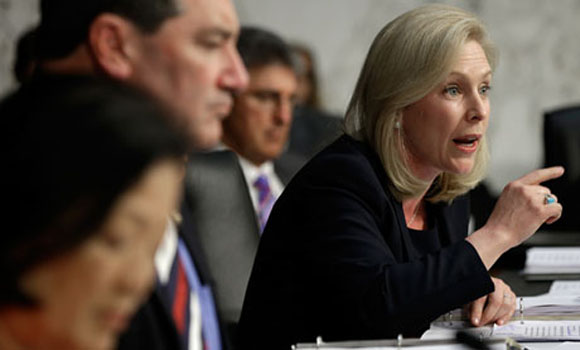Sexual assault complaints in the US military increased by an unprecedented 46% during the last year, according to the latest Pentagon figures.
There were 3,553 sexual assault complaints from October 2012 to June 2013, compared to 2,434 during the same period last year, according to statistics released on Thursday, at the start of a two-day congressional panel looking into the the problem.
It was unclear whether the upturn in official complaints could be attributed to a growing number of attacks, or whether more people felt able to report an attack.
The panel, which held hearings in September, will hear testimony from victims of sexual assault and advocates groups before reporting to the Department of Defense.
Military officials portrayed the spike in reports as a reflection of an increased confidence among victims in coming forward, after a series of initiatives designed to encourage victims to report assaults.
“A change in reports of sexual assault may reflect a change in victim confidence in Department of Defense response systems,” a 14-page slide presentation prepared for the panel read.
The congressional panel comes weeks before the Senate is expected to take up a proposal to change how the military deals with sexual assault.
Congress is considering a range of measures aimed at increasing the reporting and prosecution of sexual assault, tackling the retaliation victims often face after coming forward, and driving down the increasing numbers of men and women who suffer. The latest DoD survey found that 26,000 men and women in the military were sexually assaulted in 2011, up from 19,000 in 2010.
Earlier this week, Senator Kirsten Gillibrand, a New York Democrat, launched a fresh push for support of her measure to take the decision over whether to prosecute away from commanders and into the hands of trained military lawyers. Gillibrand has 46 senators supporting her proposal but needs another 14 on board for it to pass.
Gillibrand was joined at a press conference on Wednesday by victims’ groups, former members of the military, and a partisan group of senators who support her amendment.
But her measure has been vehemently opposed by Pentagon leaders as well as the chair of the armed services committee, Carl Levin.
Senator Claire McCaskill, a Missouri Democrat, has put forward less contentious legislation on the issue. Her amendment, supported by Levin, would keep prosecution within the chain of command, but would take away the power of commanders to overturn jury verdicts. McCaskill’s reforms would also install civilian review over decisions not to prosecute cases, mandate dishonourable discharge or dismissal for anyone convicted of sexual assault, and make it a crime to retaliate against victims who report a sexual assault.
Another measure, put forward by Senator Barbara Boxer, of California, which enjoys widespread bipartisan support, would stop victims of sexual assault and rape from having to testify at pre-trial hearings known as Article 32s. These hearings permit intrusive questions about sexual behaviour not allowed in civilian courts. Advocates groups say the hearings re-traumatise victims and can be so intimidating they deter them from coming forward.
A separate report, based on official figures obtained the Department of Veteran Affairs on Thursday, suggests that the problems of sexual assault victims continue after they leave the military.
Analysis of figures, released in a Freedom of Information Act request to the VA, show that disability claims from thousands of veterans suffering from PTSD related to sexual assault are being granted at “significantly lower” levels – up to 30% lower – than other PTSD victims.
The report, by the Veterans Legal Services Clinic at Yale, commissioned by the American Civil Liberties Union and the Service Woman’s Action Network (Swan), found that between 2008 and 2012, the grant rate for military sexual assault-related PTSD has lagged behind that of other PTSD by between 16 and 30%.
Women were rejected for grants more often than men, it found, because they were more likely to have PTSD related to sexual assault trauma. However, male veterans who reported PTSD related to sexual assault, while lower in numbers, faced grant rates even lower than women with the same symptoms.
The report, Battle For Benefits, also found treatment of PTSD related to sexual assault varied widely from one region to another. The report highlighted VA offices in St Paul, Detroit, and St Louis as particularly egregious in discriminating against such claims in 2012.
Anu Bhagwati, the executive director of Swan and a former marine captain, described the findings as a “second betrayal” of victims who are let down by the military.
Bhagwati, said she knows from experience how discriminatory the VA can be. After being sexually harassed, her claim was rejected by the VA and it took “four years, six lawyers and three members of Congress” to get the VA to admit they were wrong.
She said: “The findings we released today are evidence of a system that is broken through and through. It is heartbreaking to realize that veterans who have suffered such awful betrayals during their military service must then fight an uphill battle for the benefits owed to them by law.”
Source: theguardian


